Civic Engagement Alliance conference on Youth and Migration
The Hague, April 23th 2019
Agnes Dinkelman of Stillare was one of the key note speakers at the Civic Engagement Alliance conference on Youth and Migration, April 18th, in The Hague. The goal of the Civic Engagement Alliance was exploring the assumption the Dutch government is making that unemployment is the main rootcause of irregular migration from Sub Sahara Africa and MENA towards Europe.
Key note speakers were:
- Jan Rinzema, Senior policy officer at the Migration and Development Division at the Ministry of Foreign Affairs of the Kingdom of the Netherlands
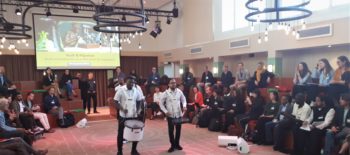
- Lothar Smith, Assistant professor, Nijmegen Centre for Border Research, Radboud University, Nijmegen
- Agnes Dinkelman, founder of Stillare, initiating the Placemaking, Cities in Green initiative, based in the Netherlands.
- David Momanyi, Executive Director of the Africa Youth Trust, based in Nairobi.
Hereby you’ll find the speech of Agnes Dinkelman. She explains the way Stillare would like to contribute to the growth of youth employment in the fast growing continent of Africa and the Arab countries. She states that youth employment and job creation will be a result of a social engineering process within the program of Placemaking, Cities in Green, where greening and urbanisation of semi-arid and arid areas thrives a new socio-economic reality.
An introduction in placemaking: cities in green
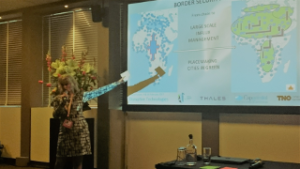 Migrant influx in Africa and the Middle East will be increasing within a decade.
Migrant influx in Africa and the Middle East will be increasing within a decade.
As a form of European border security, placemaking can be an approach to protect Europe from large influx of migrants.
Imagine 2050, according to the UN 50-200 million people will be fleeing from drought, hunger, disasters and poverty. The population in Africa is increased by 500 million and Syrië, Afghanistan, Irak, Palestine and Yemen will have a 100 million inhabitants more. The governments of these countries won’t have solutions for their people when it comes to safety, security and humanitarian aid. So we have to explore what this will mean for the stability in Africa, the Middle East and in Europe. One of the urgent questions is: “How to adress such amounts of refugees in a youth bulge area like Africa and the MENA region?” Placemaking could be one of the approaches that will help to restore communities.
Placemaking: restoring deserts, developing economic vibrant cities in the new green, collaborating with the hinterland for social economic integration.
Stillare is preparing and exploring the topic. We combine the elements of green, homification and the influx management and explore with a diversity of partners in knowledge institutes, business and governmental organizations in Europe, the Middle East and Africa if this approach could be an effective one.
Warning from Prof. Dr. Jack Goldstone fuels new solutions: “Syria, Yemen, Libya – one factor unites these failed states, and it isn’t religion”
on blogs.reuters.com, 11/2015
“[…] should remember that the connection between climate change and Islamic State – and more broadly, between climate change and political instability – is not just a coincidence. It may instead be the key reality of the 21st century.
Think now of a world in which the population under age 24 in Africa has increased by 500 million people, and the populations of Syria, Afghanistan, Iraq, Palestine, and Yemen have increased by over 100 million people. That is the UN’s projection for 2050. Add to this mix a combination of severe droughts, devastating floods, crop failures, and massive migrations that create collisions and heightened competition among ethnic and religious groups struggling for land, resources and incomes. Then think of how the governments of these regions could and would respond to such crises, and whether Europe and other safe havens could absorb even a tiny fraction of the resulting refugees. If such a world exists one day, the current crisis in Syria and the actions of IS terrorists may be multiplied many fold.”
Stillare aanwezig op Future Force Conference 2017
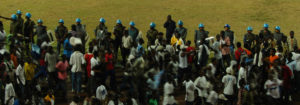
![]() Agnes Dinkelman was spreker op de Future Force Conference. Ze sprak over een integrale aanpak van complexe dreiging op het snijvlak van migratie, klimaat en conflict. Bedreigingen in Nederland en de wereld worden steeds complexer. Militair optreden alleen is niet de oplossing. Maar wat dan wel?
Agnes Dinkelman was spreker op de Future Force Conference. Ze sprak over een integrale aanpak van complexe dreiging op het snijvlak van migratie, klimaat en conflict. Bedreigingen in Nederland en de wereld worden steeds complexer. Militair optreden alleen is niet de oplossing. Maar wat dan wel?
Op uitnodiging van Defensie kwamen nationale en internationale experts en organisaties bijeen om daarover te praten. Dat gebeurde op 9 en 10 februari 2017 tijdens de Future Force Conference (FFC) in Den Haag.
“Defensie is maar een deel van de oplossing”, zegt Commandant der Strijdkrachten generaal Tom Middendorp. “We moeten in deze complexe wereld echt streven naar nieuwe en andere samenwerkingsverbanden. Ecosystemen in feite, waarbij organisaties en mensen met verschillende achtergronden en disciplines bij elkaar komen om bij te dragen aan een betere wereld. Alleen dan kunnen we werken aan duurzame vrede”.
Agnes Dinkelman was spreker op de conferentie, tijdens de breakout sessies: Disruptive Technologies.
Krijgsmacht en societal resilience in MENA
![]() Agnes Dinkelman, augustus 2016, Marineblad
Agnes Dinkelman, augustus 2016, Marineblad
Europa en MENA kampen met grote aantallen vluchtelingen en met niet aflatende terreur. Daarnaast ligt de klimaatproblematiek op de loer als grond voor toekomstige conflicten. Een mogelijke indirecte aanpak ligt in het creëren van economisch en maatschappelijk perspectief voor de jonge bevolking via een grootschalige vergroeningsaanpak. De Nederlandse krijgsmacht kan in dit proces een cruciale rol innemen.
Bekijk online
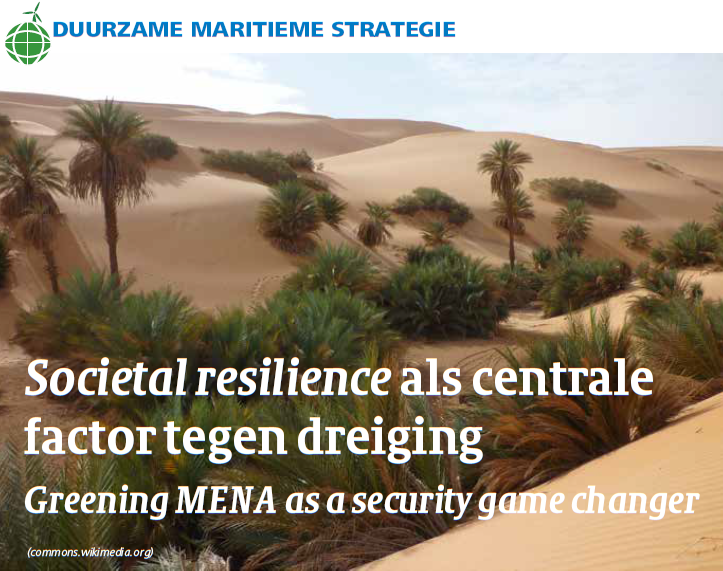
Decreasing drivers for conflict in Middle East Northern Africa
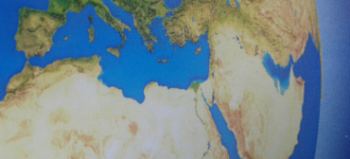 The people of the MENA region (Middle East and North Africa) face big challenges. The intensifying terror attacks in the region and beyond forces the world to respond to groups like Al Qaeda, ISIS and Al Shabaab. The vast number of young people that lack perspective and long for meaning fuels terrorism. On the issue of security, Europe and the MENA region share big challenges such as refugees and terrorism. Looking beyond the DDD policy of Defence (military response), Diplomacy and Development aid to refugees we consider that a civil offensive could become part of a successful strategy; a civil offense initiative that targets building more resilience in the societies in the MENA region; resilience in terms of security, livelihoods and climate change.
The people of the MENA region (Middle East and North Africa) face big challenges. The intensifying terror attacks in the region and beyond forces the world to respond to groups like Al Qaeda, ISIS and Al Shabaab. The vast number of young people that lack perspective and long for meaning fuels terrorism. On the issue of security, Europe and the MENA region share big challenges such as refugees and terrorism. Looking beyond the DDD policy of Defence (military response), Diplomacy and Development aid to refugees we consider that a civil offensive could become part of a successful strategy; a civil offense initiative that targets building more resilience in the societies in the MENA region; resilience in terms of security, livelihoods and climate change.
Programme description: an integral view
1. Security
2. End states
3. First steps in a journey
4. Ecology
5. Planning
A few highlights:
Next to the military interventions and diplomatic negotiations we need a civil offensive to create change.
Technically speaking it takes 2 to 5 years to turn a barren area into valuable green area providing water, micro-climate, agricultural crops, feed and food, trees, shelter, biodiversity and other ecosystem services.
The role view of men as custodian of prosperity instead of being fighters for religion or tribe can be strengthened by having economic success.
We have to arrange our work alongside a long term vision and at the same we have to work on short term success and results to win the hearts and the minds of the people.
As Europeans, being the neighbors of an important part of MENA, we can offer our help, partnership, knowledge and organizational skills. We have to respond to the threatening situation of terrorism by supporting development and strengthen the social and economic situation of the people in their and our interest.
